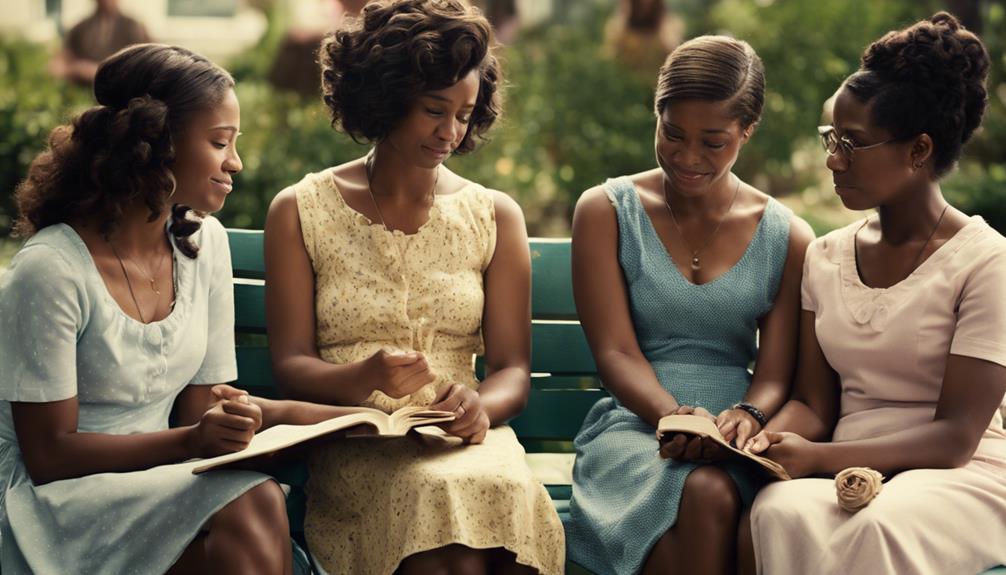Get ready to be moved by the heartwarming tale of friendship, empowerment, and courage in 'The Help'. The cast's performances, especially Viola Davis as Aibileen, beautifully capture emotional depth and resonate with audiences. The film skillfully explores 1960s race relations, shedding light on societal disparities and challenging norms. While criticisms sparked important conversations, 'The Help' manages to evoke laughter, tears, and uncomfortable truths, igniting discussions on empathy and social justice. Its impact on race and history discussions is profound, fueling debates on representation and privilege. The film's themes of standing up against injustice will surely inspire reflection and contemplation.
Cast Performances and Emotional Depth
Viola Davis's portrayal of Aibileen in 'The Help' captivates audiences with its emotional depth and authenticity, earning her critical acclaim and an Academy Award nomination.
As you watch Davis bring Aibileen to life on screen, you can't help but feel like you're witnessing a flesh-and-blood person grappling with the complexities of life in the segregated United States of the 1960s.
Her performance goes beyond acting; it feels like a window into a world that existed just outside the comfort of the viewers' own lives.
Davis's ability to convey Aibileen's pain, resilience, and quiet strength resonates deeply with audiences, drawing them into the character's struggles and triumphs.
Through her nuanced portrayal, Davis manages to bridge the gap between the fictional narrative of the film and the harsh realities faced by many African American women during that tumultuous time in American history.
Exploration of 1960s Race Relations
You'll notice how 'The Help' skillfully captures the intricate dynamics of race issues in the 1960s, shedding light on the disparities in treatment and opportunities between white families and black domestic workers.
The film paints a vivid picture of the social change that was brewing amidst racial tensions during the civil rights movement, prompting viewers to reflect on the injustices of the past and the lingering effects of systemic racism.
Through its portrayal of 1960s race relations, 'The Help' provides a powerful narrative that challenges societal norms and highlights the resilience of those who dared to defy them.
Race Issues Portrayal
In 'The Help', the exploration of 1960s race relations delves into the dynamics between black maids and their white employers in Jackson, Mississippi. The film portrays the struggles of African American characters amidst a backdrop of racism, segregation, and inequality.
While the narrative sheds light on the challenges faced by black protagonists, it has been criticized for oversimplifying the complexities of race and class dynamics during the civil rights movement. Some argue that the portrayal of white characters as saviors overshadows the agency of black individuals.
Despite its heartwarming moments, 'The Help' has faced backlash for glossing over the true violence and systemic racism of the era. The depiction of race issues in the film has sparked debate and discussion, highlighting the need for a more nuanced and authentic representation of 1960s race relations.
Social Change Depiction
Amidst the backdrop of 1960s race relations in 'The Help', the film offers a poignant portrayal of the struggles and triumphs experienced by black maids in Jackson, Mississippi.
'The Help' explores the empowerment struggles faced by African American maids within the complex racial dynamics of a segregated society. Through characters like Aibileen and Minny, viewers witness the societal challenges and systemic oppression that black individuals endured during the civil rights movement.
The narrative courageously delves into themes of resilience and solidarity among these women, challenging the norms of the time and advocating for social change. By shedding light on the racial divide and injustice prevalent in the 1960s South, 'The Help' ignites important discussions about the legacy of racism and the imperative of standing up against inequality.
The film's depiction of the struggles and victories of these maids serves as a powerful reminder of the ongoing fight for equality and justice.
Criticisms and Important Conversations

Critics have raised valid concerns about the oversimplification and problematic character portrayals in 'The Help'.
The film has faced criticism for perpetuating the white savior narrative, overshadowing the struggles and empowerment of its black characters.
Discussions on representation in media and racial stereotypes have highlighted the dangers of whitewashing history and reinforcing harmful tropes.
Additionally, the impact on society and the cultural significance of 'The Help' have sparked important conversations about race, privilege, and the responsibilities of filmmakers in portraying complex historical narratives.
Evoking Laughter, Tears, Uncomfortable Truths
You'll find yourself on an emotional rollercoaster ride while watching 'The Help', as the film masterfully weaves together moments of laughter, tears, and uncomfortable truths.
Through impactful storytelling techniques, the movie confronts the harsh realities of racism and inequality, leaving a lasting impact on viewers.
'The Help' strikes a delicate balance between humor and serious themes, sparking important conversations about empathy, understanding, and social justice.
Emotional Rollercoaster Ride
Experiencing 'The Help' is like embarking on a whirlwind journey of emotions, where laughter, tears, and uncomfortable truths intermingle to create a profoundly moving cinematic experience.
As you explore the film's intricate narrative, you're taken on an emotional rollercoaster ride filled with heartfelt moments, emotional journey. You find yourself deeply connected to the characters' struggles and triumphs, experiencing their joys and sorrows as if they were your own.
Character dynamics, narrative twists emerge as the complex relationships between the protagonists and antagonists unfold before your eyes. This keeps you on the edge of your seat with unexpected plot developments.
Empathy building, thought-provoking storytelling shines through as the film's ability to challenge your perspectives and evoke empathy towards all its characters leaves you contemplating the deeper societal issues it addresses.
Through its masterful storytelling and emotional depth, 'The Help' invites you to reflect on the power of empathy, the importance of speaking out against injustice, and the enduring impact of standing up for what's right.
Impactful Storytelling Techniques
The impactful storytelling techniques employed in 'The Help' masterfully evoke a wide range of emotions, seamlessly blending laughter, tears, and uncomfortable truths to create a compelling narrative experience.
The character dynamics within the story play an essential role in driving the emotional impact of the film. Through the interactions and relationships between characters, audiences are drawn into the heartwarming yet challenging world depicted on screen.
The narrative structure of 'The Help' is meticulously crafted to deliver moments of levity and sorrow in a balanced manner. This careful arrangement of events allows viewers to connect deeply with the characters' experiences and emotions, eliciting both laughter and tears throughout the storytelling process.
Moreover, the effective usage of symbolism in 'The Help' adds layers of meaning to the narrative, enhancing its impact on the audience. Symbolic elements woven into the storyline serve to underscore the film's themes of empowerment, resilience, and the pursuit of justice.
Together, these storytelling techniques create a thought-provoking and emotionally resonant cinematic journey that leaves a lasting impression on viewers.
Resonating With Audiences

Viewers were deeply moved by the emotional storytelling and impactful performances in 'The Help.' The film struck a chord with audiences, forging a strong connection through its raw emotional impact.
- Audience Connection: The exploration of friendship dynamics and the deep bonds formed between the characters resonated with viewers on a personal level, drawing them into the narrative.
- Empowerment Themes: 'The Help' delved into themes of empowerment, showcasing the strength found in unity and the courage displayed by individuals in the face of adversity.
- Standing Up: The film's examination of standing up against injustice and the bravery exhibited by the characters in challenging societal norms left a lasting impression on audiences, inspiring reflection on their own beliefs and actions.
The combination of these elements not only captivated viewers but also left them contemplating the importance of friendship, empowerment, and courage in their own lives.
Impact on Race and History Discussions
Engaging in discussions about race and history, the impact of 'The Help' has spurred critical conversations on privilege and representation in cinema. The film's portrayal of the civil rights era in the South has stirred debates about its historical relevance and cultural importance.
By depicting African Americans needing white intervention to bring about change, 'The Help' has been criticized for perpetuating the white savior trope. Controversies surrounding the movie include accusations of oversimplifying racism and downplaying the true struggles faced by black individuals during the civil rights movement.
While the film has resonated emotionally with audiences, it has also faced scrutiny for lacking depth in portraying the complexities of racism and white privilege. Despite these criticisms, 'The Help' has had an impactful representation in sparking conversations about race, privilege, and representation in mainstream cinema, contributing significantly to ongoing discussions about racial inequality in America.
Conclusion
To sum up, 'The Help' is a must-watch film that will tug at your heartstrings and open your eyes to the injustices of the past. The cast's performances and emotional depth will leave you captivated, while the exploration of 1960s race relations will spark important conversations.
Despite some criticisms, the film evokes laughter, tears, and uncomfortable truths that resonate with audiences to this day. So grab your popcorn, sit back, and let this anachronistic gem transport you back in time.



